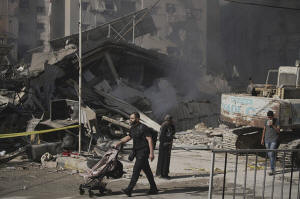Lebanese army warns Israeli airstrikes might force it to freeze
cooperation with ceasefire committee
[June 06, 2025]
By BASSEM MROUE
BEIRUT (AP) — The Lebanese army condemned Friday Israel’s airstrikes on
suburbs of Beirut, warning that such attacks are weakening the role of
Lebanon’s armed forces that might eventually suspend cooperation with
the committee monitoring the truce that ended the Israel-Hezbollah war.
The army statement came hours after the Israeli military struck several
buildings in Beirut’s southern suburbs that it said held underground
facilities used by Hezbollah for drone production. The strikes, preceded
by an Israeli warning to evacuate several buildings, came on the eve of
Eid al-Adha, a Muslim holiday.
The Lebanese army said it started coordinating with the committee
observing the ceasefire after Israel’s military issued its warning and
sent patrols to the areas that were to be struck to search them. It
added that Israel rejected the suggestion.
The U.S.-led committee that has been supervising the ceasefire that
ended the 14-month Israel-Hezbollah war in November is made up of
Lebanon, Israel, France, the U.S. and the U.N. peacekeeping forces in
Lebanon known as UNIFIL.
“The Israeli enemy violations of the deal and its refusal to respond to
the committee is weakening the role of the committee and the army,” the
Lebanese army said in its statement. It added such attacks by Israel
could lead the army to freeze its cooperation with the committee “when
it comes to searching posts.”
Since the Israel-Hezbollah war ended, Israel has carried out nearly
daily airstrikes on parts of Lebanon targeting Hezbollah operatives.
Beirut’s southern suburbs were struck on several occasions since then.

[to top of second column]
|

Citizens inspect the destruction after Israeli army strikes in the
Dahiyeh suburb of Beirut, Lebanon, Friday, June 6, 2025. (AP
Photo/Hassan Ammar)

The conflict between Hezbollah and Israel began on Oct. 8, 2023,
when the Lebanese militant group began launching rockets across the
border in support of its ally, Hamas, in Gaza. Israel responded with
airstrikes and shelling and the two were quickly locked in a
low-level conflict that continued for nearly a year before
escalating into full-scale war in September 2024.
It killed more than 4,000 people in Lebanon, including hundreds of
civilians, while the Lebanese government said in April that Israeli
strikes had killed another 190 people and wounded 485 since the
ceasefire agreement.
There has been increasing pressure on Hezbollah, both domestic and
international, to give up its remaining arsenal, but officials with
the group have said they will not do so until Israel stops its
airstrikes and withdraws from five points it is still occupying
along the border in southern Lebanon.
Hezbollah says that it has ended its military presence along the
border with Israel south of the Litani River, in accordance with
terms of the ceasefire deal.
All contents © copyright 2025 Associated Press. All rights reserved |